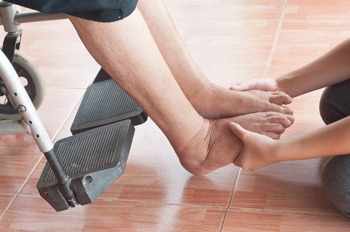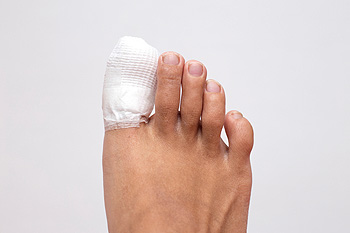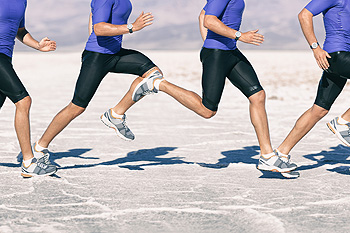 There are several ways seniors can practice proper foot care. These may include wearing shoes that fit correctly and are comfortable to wear during daily activities. It’s important the toes have adequate room to move around inside, and this may possibly avoid a pre-existing case of bunions from becoming worse. It may also prevent corns from developing. Additionally, performing a gentle exercise program frequently, may aid in keeping the blood flowing. These may include walking and stretching, which may help to maintain proper circulation. Washing the feet and drying thoroughly between the toes may be beneficial in preventing athlete’s foot from developing. When a moisturizing lotion is used, a painful condition referred to as cracked heels may be avoided. When the toenails are trimmed properly, occurrences of ingrown toenails may decrease. If you are a senior, it’s suggested to consult with a podiatrist on a frequent basis to discuss any foot conditions that may be present.
There are several ways seniors can practice proper foot care. These may include wearing shoes that fit correctly and are comfortable to wear during daily activities. It’s important the toes have adequate room to move around inside, and this may possibly avoid a pre-existing case of bunions from becoming worse. It may also prevent corns from developing. Additionally, performing a gentle exercise program frequently, may aid in keeping the blood flowing. These may include walking and stretching, which may help to maintain proper circulation. Washing the feet and drying thoroughly between the toes may be beneficial in preventing athlete’s foot from developing. When a moisturizing lotion is used, a painful condition referred to as cracked heels may be avoided. When the toenails are trimmed properly, occurrences of ingrown toenails may decrease. If you are a senior, it’s suggested to consult with a podiatrist on a frequent basis to discuss any foot conditions that may be present.
Proper foot care is something many older adults forget to consider. If you have any concerns about your feet and ankles, contact one of our podiatrists from Foot Health Center of Merrimack Valley. Our doctors can provide the care you need to keep you pain-free and on your feet.
The Elderly and Their Feet
As we age we start to notice many changes in our body, but the elder population may not notice them right away. Medical conditions may prevent the elderly to take notice of their foot health right away. Poor vision is a lead contributor to not taking action for the elderly.
Common Conditions
- Neuropathy – can reduce feeling in the feet and can hide many life-threatening medical conditions.
- Reduced flexibility – prevents the ability of proper toenail trimming, and foot cleaning. If left untreated, it may lead to further medical issues.
- Foot sores – amongst the older population can be serious before they are discovered. Some of the problematic conditions they may face are:
- Gouging toenails affecting nearby toe
- Shoes that don’t fit properly
- Pressure sores
- Loss of circulation in legs & feet
- Edema & swelling of feet and ankles
Susceptible Infections
Diabetes and poor circulation can cause general loss of sensitivity over the years, turning a simple cut into a serious issue.
If you have any questions please feel free to contact one of our offices located in North Andover, and Tewksbury, MA . We offer the newest diagnostic and treatment technologies for all your foot and ankle needs.











